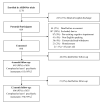Psychiatric Symptoms in Acute Respiratory Distress Syndrome Survivors: A 1-Year National Multicenter Study
- PMID: 26807686
- PMCID: PMC4833555
- DOI: 10.1097/CCM.0000000000001621
Psychiatric Symptoms in Acute Respiratory Distress Syndrome Survivors: A 1-Year National Multicenter Study
Abstract
Objective: To evaluate prevalence, severity, and co-occurrence of and risk factors for depression, anxiety, and posttraumatic stress disorder symptoms over the first year after acute respiratory distress syndrome.
Design: Prospective longitudinal cohort study.
Settings: Forty-one Acute Respiratory Distress Syndrome Network hospitals across the United States.
Patients: Six hundred ninety-eight acute respiratory distress syndrome survivors.
Interventions: None.
Measurements and main results: Psychiatric symptoms were evaluated by using the Hospital Anxiety and Depression Scale and Impact of Event Scale-Revised at 6 and 12 months. Adjusted prevalence ratios for substantial symptoms (binary outcome) and severity scores were calculated by using Poisson and linear regression, respectively. During 12 months, a total of 416 of 629 patients (66%) with at least one psychiatric outcome measure had substantial symptoms in at least one domain. There was a high and almost identical prevalence of substantial symptoms (36%, 42%, and 24% for depression, anxiety, and posttraumatic stress disorder) at 6 and 12 months. The most common pattern of co-occurrence was having symptoms of all three psychiatric domains simultaneously. Younger age, female sex, unemployment, alcohol misuse, and greater opioid use in the ICU were significantly associated with psychiatric symptoms, whereas greater severity of illness and ICU length of stay were not associated.
Conclusions: Psychiatric symptoms occurred in two thirds of acute respiratory distress syndrome survivors with frequent co-occurrence. Sociodemographic characteristics and in-ICU opioid administration, rather than traditional measures of critical illness severity, should be considered in identifying the patients at highest risk for psychiatric symptoms during recovery. Given high co-occurrence, acute respiratory distress syndrome survivors should be simultaneously evaluated for a full spectrum of psychiatric sequelae to maximize recovery.
Conflict of interest statement
The remaining authors have disclosed that they do not have any potential conflicts of interest.
Figures


Similar articles
-
Novel Risk Factors for Posttraumatic Stress Disorder Symptoms in Family Members of Acute Respiratory Distress Syndrome Survivors.Crit Care Med. 2019 Jul;47(7):934-941. doi: 10.1097/CCM.0000000000003774. Crit Care Med. 2019. PMID: 30985448 Free PMC article.
-
Cooccurrence of and remission from general anxiety, depression, and posttraumatic stress disorder symptoms after acute lung injury: a 2-year longitudinal study.Crit Care Med. 2015 Mar;43(3):642-53. doi: 10.1097/CCM.0000000000000752. Crit Care Med. 2015. PMID: 25513784 Free PMC article.
-
Psychiatric Symptoms in Survivors of Acute Respiratory Distress Syndrome. Effects of Age, Sex, and Immune Modulation.Ann Am Thorac Soc. 2017 Jun;14(6):960-967. doi: 10.1513/AnnalsATS.201606-468OC. Ann Am Thorac Soc. 2017. PMID: 28358594 Free PMC article. Clinical Trial.
-
Recovery and outcomes after the acute respiratory distress syndrome (ARDS) in patients and their family caregivers.Intensive Care Med. 2016 May;42(5):725-738. doi: 10.1007/s00134-016-4321-8. Epub 2016 Mar 30. Intensive Care Med. 2016. PMID: 27025938 Review.
-
Psychiatric morbidity in pediatric critical illness survivors: a comprehensive review of the literature.Arch Pediatr Adolesc Med. 2010 Apr;164(4):377-85. doi: 10.1001/archpediatrics.2010.10. Arch Pediatr Adolesc Med. 2010. PMID: 20368492 Free PMC article. Review.
Cited by
-
Mobile App-Based Mindfulness Intervention for Addressing Psychological Distress Among Survivors of Hospitalization for COVID-19 Infection.CHEST Crit Care. 2024 Jun;2(2):100063. doi: 10.1016/j.chstcc.2024.100063. Epub 2024 Mar 4. CHEST Crit Care. 2024. PMID: 38957856 Free PMC article.
-
Acute kidney injury contributes to worse physical and quality of life outcomes in survivors of critical illness.BMC Nephrol. 2022 Apr 7;23(1):137. doi: 10.1186/s12882-022-02749-z. BMC Nephrol. 2022. PMID: 35392844 Free PMC article.
-
Prevalence of post-traumatic stress disorder symptoms in adult critical care survivors: a systematic review and meta-analysis.Crit Care. 2019 Jun 11;23(1):213. doi: 10.1186/s13054-019-2489-3. Crit Care. 2019. PMID: 31186070 Free PMC article.
-
Co-Occurrence of Post-Intensive Care Syndrome Problems Among 406 Survivors of Critical Illness.Crit Care Med. 2018 Sep;46(9):1393-1401. doi: 10.1097/CCM.0000000000003218. Crit Care Med. 2018. PMID: 29787415 Free PMC article.
-
Psychological distress among survivors of moderate-to-critical COVID-19 illness: A multicentric prospective cross-sectional study.Indian J Psychiatry. 2021 May-Jun;63(3):285-289. doi: 10.4103/psychiatry.IndianJPsychiatry_1074_20. Epub 2021 Jun 17. Indian J Psychiatry. 2021. PMID: 34211223 Free PMC article.
References
Publication types
MeSH terms
Substances
Grants and funding
LinkOut - more resources
Full Text Sources
Other Literature Sources
Medical

